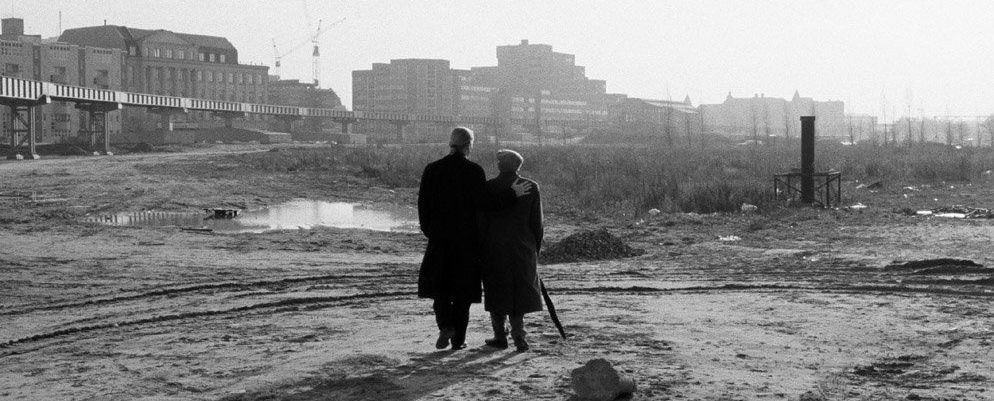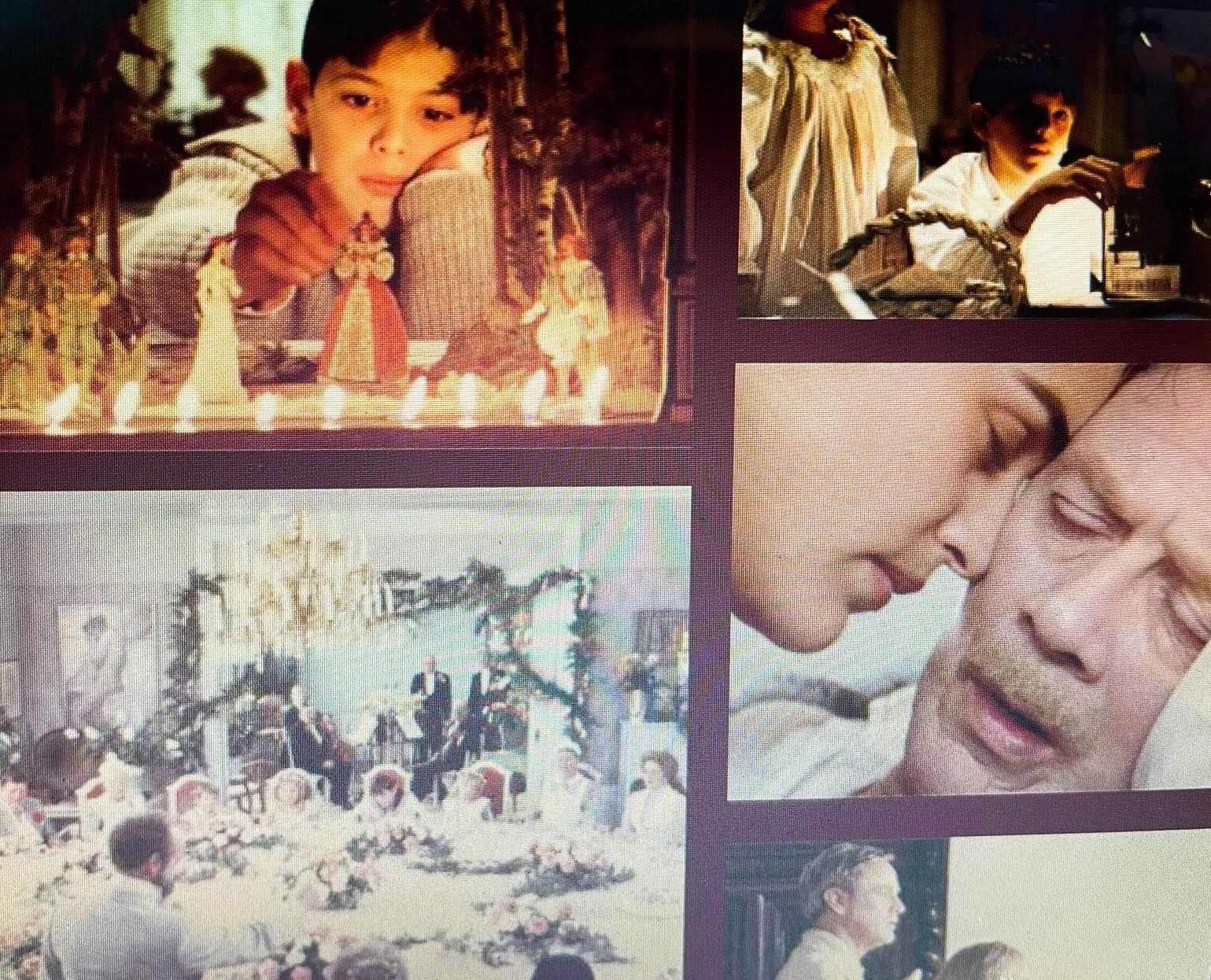Storyboard & Filmography
script
Music
Three Colors: Blue (1993)Director: Krzysztof Kieslowski
Three Colors: Blue is one of my favorite films. When Blue came out in theaters, I was completing my high school diploma at the evening school at RoRo in Dresden.
Blue, the color of liberty in the French tricolor, is here formed into an antithesis by Kieslowski. The Frenchwoman Julie loses her husband and her little daughter in a car accident. Seriously injured, she tries to take her own life in hospital. She fails. Her husband's colleague, Olivier, brings Julie a small television to her bedside, and the funeral is broadcast on television. Patrice, Julie's husband, was a famous composer who was supposed to compose a concerto grosso for "this great European festival." Next to his coffin is Anna's small child's coffin. The broadcast breaks off, the picture becomes static. A journalist pesters her in the hospital and asks about the concert. "That doesn't exist," Julie replies, leaving the journalist's question open as to whether she composed this music.
Blue:
Cooling,
Cure,
Catharsis.
Julie hires a real estate agent to sell the country estate and to use the money exclusively to care for her mother in a Parisian nursing home and for the retirement of her housekeeper and gardener. "And you?" - Julie takes only the Glass Bead Game from the blue room in a box and looks for an apartment in the anonymity of Paris. She throws the sheet music that she finds in her husband's study and that of the editor who has put the notations and all the instruments together to form the score into a garbage truck. She radically destroys all signs of her previous existence.
Julie sets up her new apartment, which is flooded with light and in need of renovation, and the first thing she does is attach the blue glowing glass bead game - the blue, reflected by a few rays of sunlight, falls on her face and sparkles. Very close by is a small café where Julie orders a coffee and an ice cream every day. There she can observe life alone and undisturbed. A flute player playing a melody opposite the café arouses her interest.
Blue: cooling, healing, catharsis.
The swimming pool is dominated by a strong midnight blue. Julie swims through the water with powerful butterfly strokes and finally swims a second lap on her back. Back in her apartment, she sees behind the curtain that a man is being beaten up by three men on the street. She hears footsteps in the house, the man knocking and calling in the hallway, and finally at her apartment door. She is unable to move. The noise dies down. As she stumbles into the hallway, a draft of air slams her apartment door shut and she spends the night on the stairs. This is how she sees the neighbors who live below her: A young woman lives to the right and is lightly scratching at the door next door. A short time later, a man sneaks out of this door and into her apartment after her. He seems to have spotted Julie sitting on the stairs because his gaze goes upwards and the young woman also comes to the door again and looks up into the stairwell.
The next day, a woman rings Julie's doorbell and wants her signature as a tenant for the young woman to move out of the house. Julie refuses and refuses to sign. On the way to the café, she sees the flute player lying on the floor and asks how he is.
"You always have to keep something," he answers her. The young woman who lives below Julie thanks her for not signing the tenants' protest, because that means she can stay in the house. Julie is sitting in the café again, her spoon reflecting the interior. A car stops at the wall opposite, the flute player is kissed by a rich woman and sits back down in his place and plays the flute. Her husband's employee, Olivier, had been looking for Julie for weeks and finally tracked her down in the café after a tip. He misses her. Julie had spent a night with him on an old mattress in the old country house because he said he loved her. Together they listen to the flute player's melody. Julie visits her mother in the retirement home. "Oh Marie-France!".
"No, it's me, Julie, your daughter." The mother is watching bungee jumping on television. "I'm doing great, I don't need anything, I have a television. You can see the whole world. Do you have a television too?" On the television, an old man is being led close to a precipice until he finally jumps down with a bungee rope. The mother asks: "Did you want to tell me something about your husband or your house? Or your children? Or maybe about you?" "Mamon... My husband and my daughter are dead. I don't have a house anymore." "That's what they told me." Julie: "You know, I used to be happy... They loved me and I loved them." The television image with the slack bungee rope is shown, the old man flies into the picture with his arms outstretched (like the crucified man), a different camera perspective is shown using a fade, the old man falls (like on the cross) towards the viewers. "Mamon... Are you listening to me...?" "I'm listening to you." Julie lowers her gaze: "But now I understand that I will only do one thing: nothing. That I no longer want possessions, memories, relationships, love, commitment, friends. These are all just traps.""Do you have enough money, my child, enough to live on?""I have what I need.""That's important. You can't do without everything." Julie nods mechanically.
The magician of images and antitheses Krzysztof Kieslowski has succeeded in creating a brilliant counterpoint to the ideal of freedom in Three Colors: Blue. Juliette Binoche's acting reflects the bare existence and need, the hopelessness of loss and grief, as well as the fatality of not being able to live without relationships. Love for one's neighbour - this is also shown in the Song of Songs and also in Julie's face with its grief and longing - is the counterpoint to freedom, to lack of relationships. The figure of the demented mother with her lost memories is also dignified in the film; where speaking in tongues and prophetic speech will end, unconditional love will survive. Living with dignity also applies to people who lose their memories.
Julie is in the swimming pool, but now the blue in its severe coolness no longer dominates - reality is breaking more and more into Julie's life. Lucile, the young prostitute who lives below Julie, approaches the pool and notices that Julie is crying. "It's just water." Lucile hugs Julie and comforts her. That night she calls Julie and asks her to come to the nightclub. Lucile spotted her father among the spectators. "Who can I rely on now?"
She spots Julie on the television. Julie is shocked. Her husband's ex-employee, Olivier, is sitting with the pushy journalist in the television studio and tells him that her husband Patrice started the concerto grosso and that he has the notation. Photos of a young, beautiful woman accompanied by Julie's husband, who had the accident, appear on the television.
Julie visits the music editor: she has made copies of the score and sent them to Strasbourg. Olivier now wants to finish the concerto grosso. Julie hesitantly devotes herself to the notes and individual instruments and works on the concerto with Olivier. She asks about her lover, whose long-term relationship Olivier knew about. She worked as a legal trainee in the court. Julie visits her. In doing so, she briefly becomes involved in the ongoing trial of the Pole Karol from Three Colors: White. Julie follows Patrice's lover into the toilet of a restaurant. There it becomes clear that the lover is pregnant. The lover says that she knew nothing about her situation until the accident. Now she will keep the child. Julie instructs the estate agent to reverse the sale of the country estate. She shows her pregnant lover the rooms and explains to her that everything now belongs to her and her unborn son. The lover laughs. "Patrice has talked a lot about you. That you are a good person. And that you are that of your own free will."
Julie calls Olivier and goes to him. She shows him the verses for the choir in a book. The images in the finale resemble a round dance: Olivier is with Julie, who is drowning, flooded with blue, as if on a pane of glass; the boy who witnessed the accident and looks at Anna's cross, which Julie gave him, turns off the alarm clock; the mother, whose memories are lost, looks into the distance; in the nightclub, Cecile stares sadly into the void and the lover sees the new life that has emerged, the moving embryo, during an ultrasound scan. In the finale, the choir sings the verses to the completed piece of music for the first time:
If I speak in the tongues of men and of angels, but have not love, I am only a noisy gong or a clanging cymbal. And if I have the gift of prophecy, and understand all mysteries and all knowledge, and have all faith, so as to remove mountains, but have not love, I am nothing. And if I give all that I have to the poor and give my body to glory, but have not love, it profits me nothing. Love is patient and kind; love does not envy or boast or is arrogant or vain; it does not behave rudely; it does not seek its own; it is not provoked or takes no account of evil; it does not rejoice at iniquity, but rejoices with the truth; it bears all things, believes all things, hopes all things, endures all things. Love never ends, though prophecy will cease and knowledge will pass away. Now faith, hope, and love remain, these three; but the greatest of these is love.
In the final scene, Julie is crying.





